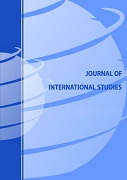DOES POLITICAL REGIME MATTER FOR ABNORMAL HOARDING OF INTERNATIONAL EXCHANGE RESERVES?
DOES POLITICAL REGIME MATTER FOR ABNORMAL HOARDING OF INTERNATIONAL EXCHANGE RESERVES?
Author(s): Viktor KoziukSubject(s): National Economy, Governance, Economic policy, International relations/trade, Financial Markets
Published by: Fundacja Centrum Badań Socjologicznych
Keywords: international exchange reserves hoarding; central banks; political regimes; financial development; quality of institutions;
Summary/Abstract: It is shown that political business-cycle approach to a political and institutional analysis of large exchange reserves hoarding is not full story. It is stressed, the choice of the central bank to accumulate reserves or not is not defined per se. Such choice is a consequence of political and economic consensus on the design of the mechanism of macrofinancial stability and the channels of macroeconomic adjustment. It is shown that political regimes are important proxies to understand why countries differ in incentives to hoard as well as accumulate in the long-run. At the same time, while autocracies outperforme democracies in reserves hoarding, the situation is not so simple. Institutional factors matter. This means that heterogeneity across political regimes may also play a role. The analysis of reserves distribution shows that autocracies are less homogenous. These results are substantiated by general multi-factor regression. While large hoarding is more typical of the countries with large GDP per capita, less democratic political regime and less independent central banks do not choose flexible exchange rates; i.e. only autocracy with some threshold level of development ( including political and macroeconomic stability) can hoard reserves sustainably. Autocracies have better preconditions for reserves hoarding only when they are able to push a prudent macroeconomic policy. At the same time, democracies have better preconditions for alternative institutional paths, under which some alternative channels of macroeconomic adjustment could potentially arise. This finding has strong practical implication. The independence of the central banks as well as the structural reforms addressed to financial development support macroeconomic adjustment with lower level of exchange reserves.
Journal: Journal of International Studies
- Issue Year: 14/2021
- Issue No: 2
- Page Range: 208-227
- Page Count: 20
- Language: English

